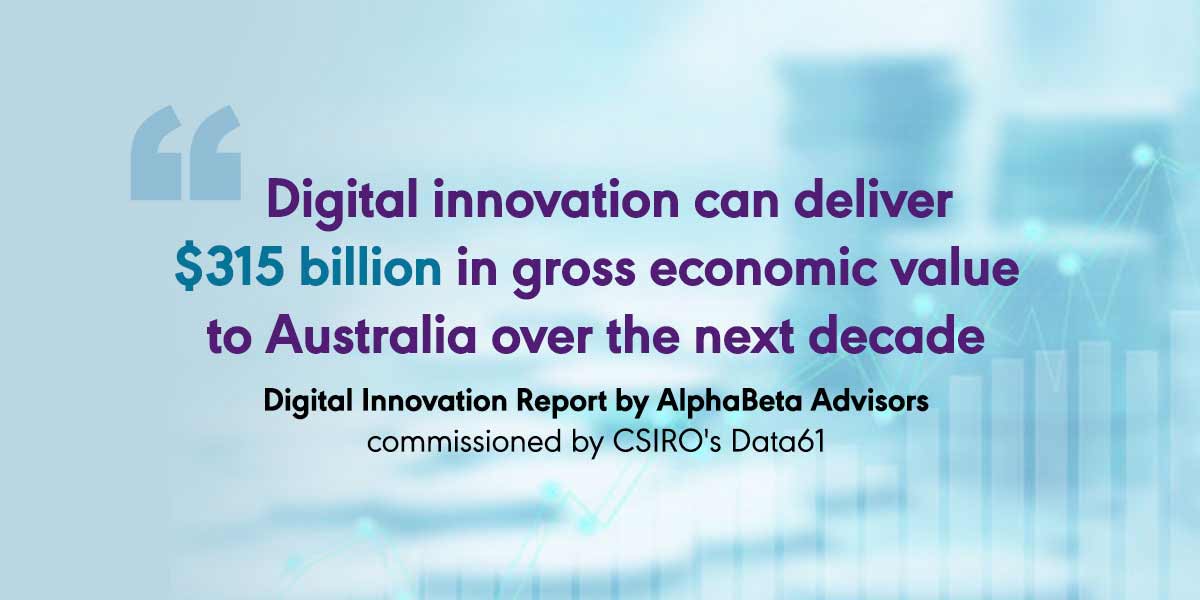Digital transformation goes global: what opportunities will it create?

Back in 2018, digital innovation was expected to contribute $315 billion in gross economic value to Australia over the subsequent 10 years, with that figure drawn from the impact of Australia “improving productivity growth, ICT capital investment, fostering domestic digital industries and improving export performance.” Now, thanks to COVID-19, we are seeing organisations look to digitalisation far sooner than they may have initially planned.
But there’s a catch: an economic boost from digital innovation is only possible if Australia starts chasing its global peers in embracing digital transformation. In other words, the time to digitalise is now.
THE STATE OF DIGITAL TRANSFORMATION
An unfortunate truth is that Australia has failed to fully capitalise on years of strong economic growth, which has allowed more digitally aggressive global peers to overtake us. Here are some examples:
- China is committed to being a “world-leader in AI” by 2030, envisioning a $210 billion domestic industry.
- North America attracted $15–23 billion in private-sector AI investments in 2016 alone.
- The UK launched a $1.8 billion program while Asian economies such as Japan, Korea and Singapore are “making large investments into AI technology”.
Sound familiar? Probably because, again, governments aren’t experiencing anything that isn’t found in the macroeconomic narratives across private industry today. Incumbents rise to the top (such as holding dominant market share) while ignoring smaller competitors. These competitors get busy exploiting new digital opportunities to find step-function changes in production or overall productivity/efficiency until it’s almost too late for the ‘big ships’ to turn and follow.
So what’s the solution? Public–private partnerships. While this may not be the right path for every company, the blueprint holds a great deal of transferable wisdom. One central truth is that digital transformation requires highly strategic investments across a smaller set of opportunities in order to drive large-scale outcomes.
Those looking to innovate must also leverage their innate advantages, rather than simply mirroring what other companies (or countries) are trying to achieve. It is only by building on these strengths that organisations will stay relevant and move forward.
WHAT PROGRESSIVE DATA-DRIVEN ORGANISATIONS MUST DO
In its digital innovation report, Data61 recommends investing in four key areas: data capture, data management, data analysis, and taking action with the data.
“Combining this data with domain expertise, in areas like healthcare, agriculture and mining, is where we can create an unfair advantage,” says Adrian Turner, Founding CEO at Data61.
Here’s some more detail:
| Data capture | Data management | Data analysis | Data decisions and action |
|
|
|
|
By investing in data-driven digital innovation, you add economic value by improving the productivity of existing industries and by creating revenue from new industries, products and services.
We see this all the time in our own advisory: the imperative to leverage transformation in the face of global competition is urgent for organisations of all shapes and sizes. It becomes a question not of ‘if’ but ‘when’ and then ‘how’.
TAKING THE LEAP FORWARD INTO DIGITAL INNOVATION
Digital transformation, when done right, is fundamentally disruptive. To manage that disruption, you need help.
Executives often need support translating a vision into a concrete set of strategies that the business can implement with accountability and total alignment. Business managers and frontline decision-makers need the tools to mobilise their teams towards this shared vision of the future. And individuals doing the daily work in the trenches need reinforcement and motivation to keep going, especially when the path gets rocky.
One way to maintain a steady focus is by looking at digital-transformation opportunities through the lens of your specific industry.
One example from the Data61 report explored how to tackle food provenance and supply-chain traceability by partnering with the NSW Department of Primary Industries. “The aim is to ensure product integrity and minimise food fraud specifically for cherries, rock lobsters, abalone and citrus.” The issue was identified as a critical threat to Australia’s economic growth and development, “with food fraud alone costing Australia $65 billion per year due to counterfeiting produce.”
Note the clear impact. $65 billion cannot be ignored. What’s the impact of digital transformation on your lines of business? What are the opportunities that can be communicated clearly and consistently to anyone in the organisation? What’s the cost of doing nothing?
These are only some of the questions that must be asked as you embark on your journey towards digital transformation. But remember: the future is for the taking.
If you are interested in learning more about our transformation services and experience with digital innovation, contact the experts at PM-Partners or call us on 1300 70 13 14 today.








